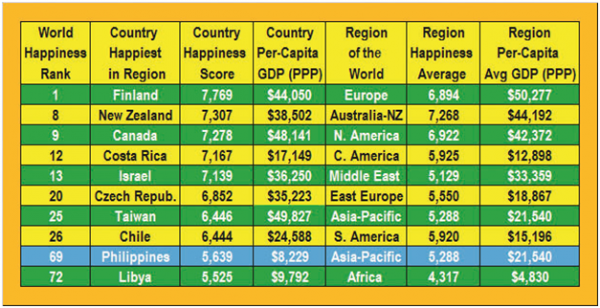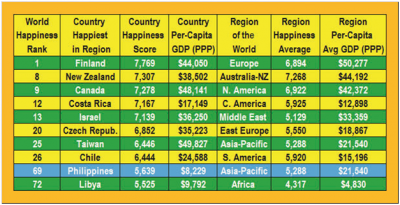By Kumar Balani
NEW YORK, NY – When I was a kid growing up in Bangalore, India, one of the countries I dreamed of living in was Switzerland. Our English language-geography teacher mentioned many Swiss-made goodies our family relished, like Nestle chocolate bars, Ovaltine choco-milk.
Desires and priorities change as people grow up, and that’s what happened as my mother passed away, and my two brothers, my sister and I, went to the Philippines to join our father and two elder brothers. Then, high US living standards were a big lure, so I came and eventually settled here to establish a life of happiness that involves giving – helping people improve their lives with the power of information.
You may have heard that “happiness comes from within,” and while I do believe that, the dreams, desires, and goals people have can be realized faster in progressive countries versus those with painfully-slow paces of advancement. With my curiosity about what makes people happy, and in which countries are found the happiest people, I was lucky (and happy) recently to find something called the World Happiness Report.
In this global Gallup survey, the Philippines ranked No.69 in happiness among 156 countries ranging from the highest GDP per capita (PPP basis) for Qatar at $124,927 to just $681 for Central African Republic. This ‘Pearl of the Orient Seas’ has among the top 45 percent of happiest people on Earth. Where in the world do the happiest people live? They top seven live in central-northern Europe. From 1 to 7 they are Finland, Denmark, Norway, Iceland, the Netherlands, Switzerland and Sweden.
Here’s a visual image of GDP per capita comparisons to happiness scores of countries and averages for each region. As you can see, for the most part, there are very strong correlations. 
This was the seventh such global study on happiness (the first was done in 2012) conducted last March by Gallup, a large international polling company that works on important matters affecting people. In studies within the ‘science of well-being’ Gallup is discovering how big data, cultural norms, drug addiction, finances, governments, immigration, incomes, information technology, jobs, social media, and other influences, impact communities.
‘Happiness Score’ Factors: An average ‘happiness score’ was determined for each country based on data from international organizations, or from responses to questions (shown in quotes below) relating to eight factors:
- Absence of corruption – “Is corruption widespread throughout your government or not?” and “Is corruption widespread within businesses or not?”
- Freedom – is the national average of the binary responses (either 0 or 1) to the question “Are you satisfied or dissatisfied with your freedom to choose what you do with your life?”
- GDP per capita – is measured on the basis of Purchasing Power Parity or PPP, a local, more realistic view of a country’s prices and incomes, adjusted to constant 2011 United States dollars.
- Generosity- is the residual of regressing to the national average of responses to the question “Have you donated money to a charity in the past month?”
- Healthy life expectancy – the time series of healthy life expectancy at birth are constructed based on data from the World Health Organization (WHO) Global Health Observatory data.
- Negative Affect – is the average of previous-day affect measures for worry, sadness, and anger for all waves.
- Positive Affect – is the average previous-day affect measures for happiness, laughter, and enjoyment based on the question “Did you experience the following feelings during a lot of the day yesterday: happiness, laughter, and enjoyment?”
- Social support – is the national average of the binary responses (either 0 or 1) to the question: “If you were in trouble, do you have relatives or friends you can count on to help you whenever you need them, or not?”
Kumar (Kem) Balani has an AB Journalism degree from the University of the Philippines and an MA in Politics from New York University. He is founder and publisher of Biz India Online News since 2002. Go to www.BizIndia.net to read book reviews, features, news, opinion columns, and videos on business, entertainment, investing, law, sports, technology, and more.
This column first appeared in the Daily Tribune in the Philippines on Sunday, May 05, 2019. Read Kumar Balani’s columns in that newspaper: http://tribune.net.ph/index.php/author/kumar-balani/







